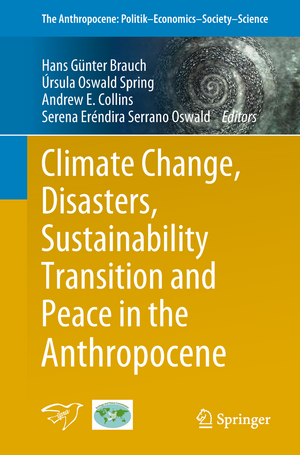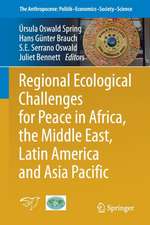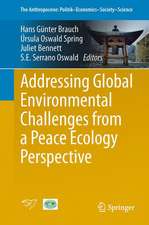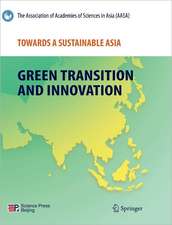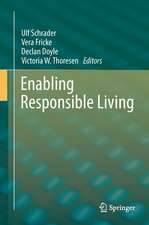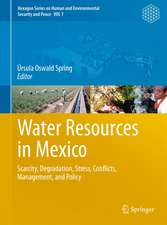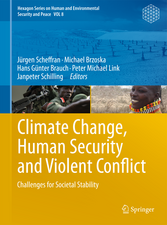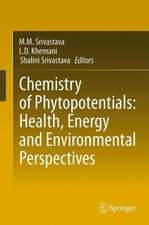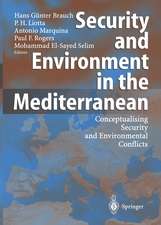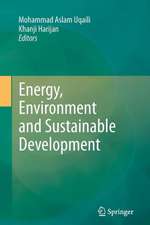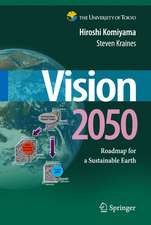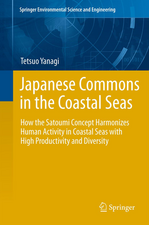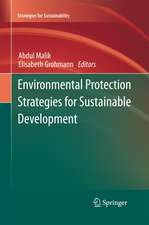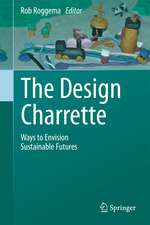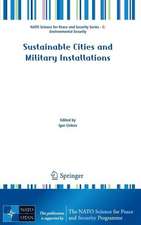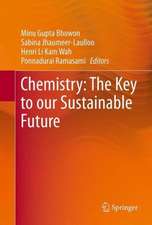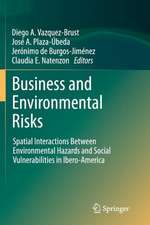Climate Change, Disasters, Sustainability Transition and Peace in the Anthropocene: The Anthropocene: Politik—Economics—Society—Science, cartea 25
Editat de Hans Günter Brauch, Úrsula Oswald Spring, Andrew E. Collins, Serena Eréndira Serrano Oswalden Limba Engleză Paperback – 2 oct 2018
Din seria The Anthropocene: Politik—Economics—Society—Science
-
 Preț: 403.48 lei
Preț: 403.48 lei -
 Preț: 361.89 lei
Preț: 361.89 lei -
 Preț: 380.63 lei
Preț: 380.63 lei - 20%
 Preț: 583.00 lei
Preț: 583.00 lei -
 Preț: 389.49 lei
Preț: 389.49 lei -
 Preț: 390.46 lei
Preț: 390.46 lei - 5%
 Preț: 361.80 lei
Preț: 361.80 lei -
 Preț: 379.09 lei
Preț: 379.09 lei -
 Preț: 384.48 lei
Preț: 384.48 lei -
 Preț: 380.84 lei
Preț: 380.84 lei -
 Preț: 451.26 lei
Preț: 451.26 lei -
 Preț: 391.40 lei
Preț: 391.40 lei -
 Preț: 430.21 lei
Preț: 430.21 lei -
 Preț: 387.75 lei
Preț: 387.75 lei -
 Preț: 378.34 lei
Preț: 378.34 lei -
 Preț: 418.29 lei
Preț: 418.29 lei - 5%
 Preț: 399.91 lei
Preț: 399.91 lei -
 Preț: 428.07 lei
Preț: 428.07 lei -
 Preț: 392.75 lei
Preț: 392.75 lei -
 Preț: 424.22 lei
Preț: 424.22 lei -
 Preț: 384.09 lei
Preț: 384.09 lei -
 Preț: 429.61 lei
Preț: 429.61 lei -
 Preț: 381.98 lei
Preț: 381.98 lei -
 Preț: 415.83 lei
Preț: 415.83 lei -
 Preț: 382.18 lei
Preț: 382.18 lei - 15%
 Preț: 647.40 lei
Preț: 647.40 lei - 18%
 Preț: 1123.04 lei
Preț: 1123.04 lei - 15%
 Preț: 579.34 lei
Preț: 579.34 lei - 18%
 Preț: 802.46 lei
Preț: 802.46 lei - 18%
 Preț: 944.51 lei
Preț: 944.51 lei -
 Preț: 383.33 lei
Preț: 383.33 lei -
 Preț: 383.33 lei
Preț: 383.33 lei -
 Preț: 383.33 lei
Preț: 383.33 lei -
 Preț: 380.07 lei
Preț: 380.07 lei -
 Preț: 413.66 lei
Preț: 413.66 lei -
 Preț: 417.52 lei
Preț: 417.52 lei
Preț: 386.39 lei
Nou
Puncte Express: 580
Preț estimativ în valută:
73.96€ • 80.36$ • 62.17£
73.96€ • 80.36$ • 62.17£
Carte tipărită la comandă
Livrare economică 22 aprilie-06 mai
Preluare comenzi: 021 569.72.76
Specificații
ISBN-13: 9783319975610
ISBN-10: 3319975617
Pagini: 198
Ilustrații: XVII, 246 p. 21 illus., 20 illus. in color.
Dimensiuni: 155 x 235 mm
Greutate: 0.38 kg
Ediția:1st ed. 2019
Editura: Springer International Publishing
Colecția Springer
Seria The Anthropocene: Politik—Economics—Society—Science
Locul publicării:Cham, Switzerland
ISBN-10: 3319975617
Pagini: 198
Ilustrații: XVII, 246 p. 21 illus., 20 illus. in color.
Dimensiuni: 155 x 235 mm
Greutate: 0.38 kg
Ediția:1st ed. 2019
Editura: Springer International Publishing
Colecția Springer
Seria The Anthropocene: Politik—Economics—Society—Science
Locul publicării:Cham, Switzerland
Cuprins
Introduction.- Advancing Disasters and Conflict Risk Reduction.- Responding to Socio-environmental Disasters in High-Intensity Conflict Scenarios: Challenges and Legitimation Strategies.- The Fragile State of Disaster Response: Understanding Aid-State-Society Relations in Post-Conflict Settings.- Climate-smart agriculture and a sustainable food system for a sustainable-engendered peace.- Ethnology of Select Indigenous Cultural Resources for Climate Change Adaptation: Responses of the Abagusii of Kenya.- Social Representations and the Family as a Social Institution in Transition in Mexico.- Sustainable Peace through Sustainability Transition as Transformative Science: A Peace Ecology Perspective in the Anthropocene.
Textul de pe ultima copertă
This book provides insight into Anthropocene-related studies by IPRA’s Ecology and Peace Commission. The first three chapters discuss the linkage between disasters and conflict risk reduction, responses to socio-environmental disasters in high-intensity conflict scenarios and the fragile state of disaster response with a special focus on aid-state-society relations in post-conflict settings. The two following chapters analyse climate-smart agriculture and a sustainable food system for a sustainable-engendered peace and the ethnology of select indigenous cultural resources for climate change adaptation focusing on the responses of the Abagusii in Kenya. A specific case study focuses on social representations and the family as a social institution in transition in Mexico, while the last chapter deals with sustainable peace through sustainability transition as transformative science concluding with a peace ecology perspective for the Anthropocene.
Caracteristici
Addresses socio-environmental disasters and disaster response and conflict risk reduction challenges in the Anthropocene Deals with indigenous cultural resources for climate change and with climate smart agriculture Discusses Social Representations and the Family as a Social Institution in Transition in Mexico Offers perspectives on sustainable peace through sustainability transition in the Anthropocene
